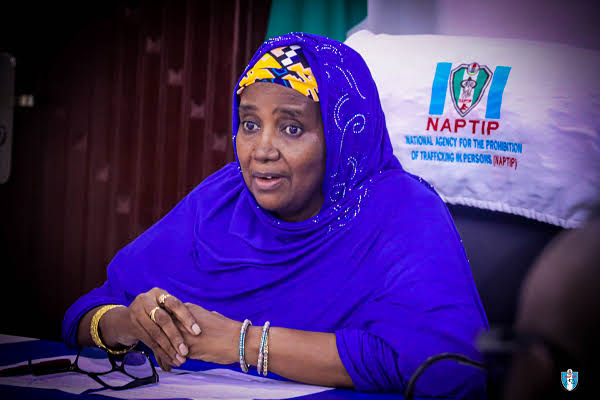The National Agency for the Prohibition of Trafficking in Persons (NAPTIP) has raised concerns over a disturbing rise in new trafficking patterns across Nigeria and Ghana, warning that human trafficking is taking on more dangerous and organised dimensions.
Director-General of NAPTIP, Dr. Binta Adamu Bello, disclosed this at a press conference in Abuja on Thursday, to flag off a week-long campaign to mark the 2025 World Day Against Human Trafficking.
She said criminal networks are increasingly exploiting digital platforms, migration flows, and economic desperation to perpetrate crimes.
Among the most alarming trends, Bello revealed, are organ harvesting, online sextortion, and “loan-for-sex” schemes—an emerging tactic where women are lured into prostitution under the guise of repaying fraudulent online loans.
“Organised crime syndicates are driving victimisation through deceit, coercion, and digital manipulation. These are not isolated incidents—they are structured criminal operations,” Bello said.
She noted that fake job offers and scholarship scams have also become tools of deception, while cybercrime syndicates are recruiting unsuspecting youth—particularly in Nigeria and Ghana—into internet fraud operations popularly called “Yahoo-Yahoo.”
Other illicit practices identified include the operation of baby factories, and the use of “marketing agent” recruitment as a front to traffic victims for sexual or labour exploitation.
Bello warned that these crimes are evolving rapidly, adding that “human trafficking is now a highly coordinated, cross-border criminal enterprise” that demands urgent and collective action.
This year’s global theme, “Human Trafficking is Organized Crime – End the Exploitation,” underscores the need for robust inter-agency coordination and community vigilance.
The NAPTIP boss also emphasized the need for unity among stakeholders, stressing that “this is not a time for rivalry but collaboration.”
“Women, children, the elderly, and people with disabilities are the most vulnerable. We must all work together—government, civil society, law enforcement, and citizens—to eliminate these threats to our national fabric,” she added.
Bello said NAPTIP is already intensifying its counter-trafficking efforts through expanded awareness campaigns, enforcement drives, victim rehabilitation, and prosecution of offenders.
She highlighted that the agency has enhanced its cybercrime unit and is now working in synergy with the Federal Ministry of Justice’s Joint Case Team on Cybercrime (JCTC), as well as other law enforcement and intelligence agencies.
“In the coming months, it will be tougher for traffickers. We are boosting surveillance and strengthening coordination with state and non-state actors nationwide,” she assured.
She called on Nigerians to support the agency’s mission by reporting suspicious activities and protecting vulnerable persons from exploitation.
“Together, let us kick human traffickers out of Nigeria,” Bello declared.
The World Day Against Human Trafficking is observed annually on July 30, and this year’s campaign seeks to drive global attention to the links between organised crime and modern slavery.
Do you want to share a story with us? Do you want to advertise with us? Do you need publicity for a product, service, or event? Contact us on WhatsApp +2348183319097 Email: platformtimes@gmail.com
We are committed to impactful investigative journalism for human interest and social justice. Your donation will help us tell more stories. Kindly donate any amount HERE




